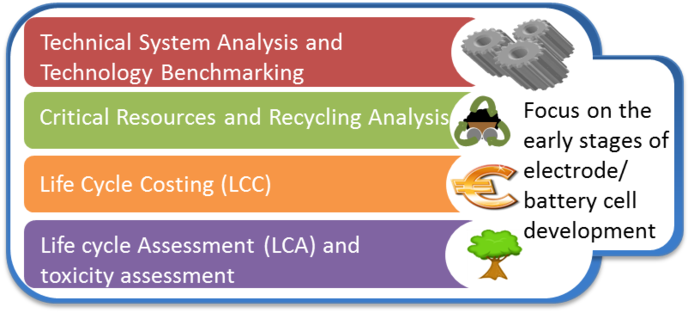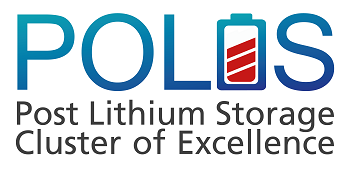HIU-Newsletter
You a scientist yourself? A journalist, a political decision-maker or business representative? In our newsletters we compile the latest battery research news for you. Specially tailored to your personal area of interest.
In der Forschungsgruppe "Ressourcen, Umwelt & Nachhaltigkeit" laufen die technische Systemanalyse mit der ökologischen und ökonomischen Systemanalyse zusammen. Ziel ist es Aspekte der Nachhaltigkeit so früh wie möglich in der Entwicklungsphase von Batteriesystemen zu berücksichtigen.
Neue Technologien müssen nicht nur höheren technischen Anforderungen genügen oder helfen technologische Hürden zu überwinden, sondern auch die verschieden Dimensionen der Nachhaltigkeit (ökonomische, ökologische und soziale Aspekte) positiv zu beeinflussen bzw. zu gestalten. Die Arbeitsgruppe unterstützt dabei die nachhaltigere Entwicklung neuer elektrochemischer Energiespeicher-Technologien.
Dabei liegt der Fokus der Arbeiten unter anderem auf der Verfügbarkeit von Ressourcen (als mögliches Hindernis für Innovationen), Umwelt / Toxikologischen Aspekten und dem Recycling von elektrochemischen Traktionsbatterien. Ein wichtiges Ziel ist es, gemeinsam mit den Technologie-Entwicklern Nachhaltigkeitsaspekte bereits in der frühen Designphase von Batteriesystemen zu berücksichtigen. Hierbei wird eine technische Systemanalyse mit einer ökologischen und ökonomischen (sozialen), lebenswegbezogenen Systemanalyse kombiniert. So soll ein vertieftes Verständnis hinsichtlich technischer Bedürfnisse, Umweltwirkungen und ökonomischer Machbarkeit von zukünftigen Batteriesystemen ermöglicht werden.
Im Rahmen der POLIS-Aktivitäten liegt der Forschungsschwerpunkt derzeit auf der ökologischen, ökonomischen und sozialen Ökobilanz (LCA) von Natrium- und Magnesium-Zellmaterialien und Zellsystemen. Besonderes Augenmerk wird auf Screening-Prozesse von Natrium-Kathodenmaterialien und die Ökobilanz von Hartkohlenstoffmaterialien aus verschiedenen Vorläufern gelegt. Darüber hinaus wird die Entwicklung PFAS-freier Bindemittel durch Nachhaltigkeitsbewertungen zur Identifizierung vielversprechender Designkorridore unterstützt.


Diese Forschungsgruppe wird teilweise von der Deutschen Forschungsgesellschaft (DFG) durch den Exzellenzcluster POLiS gefördert.
The Research Group for Resources, Recycling, Environment and Sustainability is responsible for the system analysis of energy storage systems through Life Cycle Assessment, Material Flow Analysis and related tools.
One major objective of the Research group is the cooperation with technology developers in order to incorporate sustainability aspects in the early development phases of battery systems. In this context technical system analysis is combined with life-cycle oriented environmental and economic system analysis.
This approach aims at creating a deeper understanding of the technological requirements, environmental impacts and economic feasibility of prospective battery systems.
By embedding sustainability aspects in the early technology design phase, potential innovation risks can be identified prospectively and minimized by appropriate measures. An essential task of our group is to provide relevant knowledge that can direct the development of battery systems towards the path of sustainability. Such knowledge can be used to support decision-making (e.g. selection of prospective anode materials).
Further activities prospectively examine potential value chains of selected future cell systems. Regarding the beginning of the chain, a potentially restricted future access to strategically important raw materials is considered as a possible obstacle for the introduction and success of technological innovations. For that reason we assess prospectively the availability of resources (e.g. lithium and transition metals) for the production of both traction batteries and stationary batteries.
Concerning the end of the chain, we also focus on the recyclability of electrochemical energy storage systems. Due to technical and economic reasons, current recycling technologies for batteries (most of which are still under development) do not recover all the materials from the battery cells (e.g. lithium is generally not recovered). A roadmap for this sector will help determine the technical, economic and environmental obstacles and identify ways to overcome these barriers. Furthermore, it has to be analyzed whether the recycling technologies currently under development are also suitable for novel cell systems developed by HIU, or if new or adjusted recycling technologies must be developed.
Regardless of the alternative, its economic and environmental effects will have to be assessed.
Dr. Marcel Weil (Principal Investigator):
The Research Group for Resources, Recycling, Environment and Sustainability is responsible for the system analysis of energy storage systems through Life Cycle Assessment, Material Flow Analysis and related tools.
One major objective of the Research group is the cooperation with technology developers in order to incorporate sustainability aspects in the early development phases of battery systems. In this context technical system analysis is combined with life-cycle oriented environmental and economic system analysis.
This approach aims at creating a deeper understanding of the technological requirements, environmental impacts and economic feasibility of prospective battery systems.
By embedding sustainability aspects in the early technology design phase, potential innovation risks can be identified prospectively and minimized by appropriate measures. An essential task of our group is to provide relevant knowledge that can direct the development of battery systems towards the path of sustainability. Such knowledge can be used to support decision-making (e.g. selection of prospective anode materials).
Further activities prospectively examine potential value chains of selected future cell systems. Regarding the beginning of the chain, a potentially restricted future access to strategically important raw materials is considered as a possible obstacle for the introduction and success of technological innovations. For that reason we assess prospectively the availability of resources (e.g. lithium and transition metals) for the production of both traction batteries and stationary batteries.
Concerning the end of the chain, we also focus on the recyclability of electrochemical energy storage systems. Due to technical and economic reasons, current recycling technologies for batteries (most of which are still under development) do not recover all the materials from the battery cells (e.g. lithium is generally not recovered). A roadmap for this sector will help determine the technical, economic and environmental obstacles and identify ways to overcome these barriers. Furthermore, it has to be analyzed whether the recycling technologies currently under development are also suitable for novel cell systems developed by HIU, or if new or adjusted recycling technologies must be developed.
Regardless of the alternative, its economic and environmental effects will have to be assessed.
Dr. Marcel Weil (Principal Investigator):
 Dr. Marcel Weil Resources, Recycling, Environment & Sustainability
Dr. Marcel Weil Resources, Recycling, Environment & SustainabilityORCID: 0000-0003-0151-9990
Scopus Author ID: 57040558700
KIT Subsite of Marcel Weil
You a scientist yourself? A journalist, a political decision-maker or business representative? In our newsletters we compile the latest battery research news for you. Specially tailored to your personal area of interest.